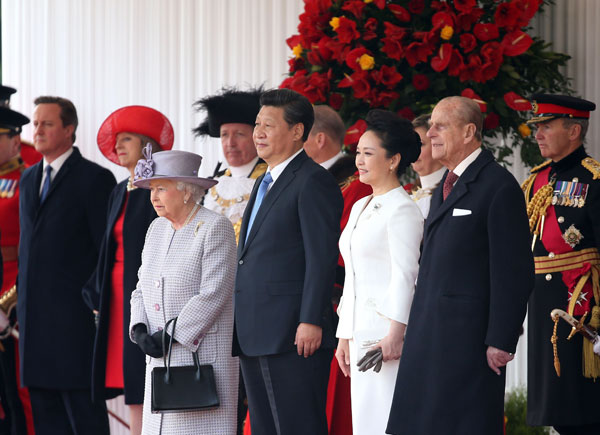
Xi Jinping's state visit to Britain has significantly deepened Sino-British relations. It heralds a big step forward in trade, commerce, investment and people to people contacts. However, the visit will provoke some profound soul searching in Britain about its place in the world. And a big job remains to be done to educate the British public about the reality of Chinese society, politics and economics.
Britain's ruling Conservative Party is attacking workers' living standards, so many feel suspicious of their dealings with China. Others feel threatened by global changes in economic conditions. In September some private steel companies based in Britain tried to amend quality control regulations to stop Chinese imports. The plan failed. However, the announcement of closures and job losses in the steel industry came at the time of Xi Jinping's arrival; and the lack of profits at these companies was wrongly attributed to China. This caused protests by workers and encouraged British politicians to raise the issue with Xi Jinping. It appears that these companies are using this as a means to lobby for state subsidies and protectionism. Ironically, the Indian owned TATA steelworks presented itself as the defender of the British steel industry and therefore, no doubt, deserving of the taxpayers' support to save British jobs. One consequence was that Labour Party MPs began to complain about Chinese steel imports and, all sorts of nonsensical posts on social media claimed that "Chinese products" are "inferior" to British ones and that Chinese goods are produced only by "cheap labour".
This was not helped by a hysterical piece of propaganda presented by the journalist Carrie Grace for the BBC's Panorama TV show called "The Xi Factor". It portrayed a weird and skewed version of the rise of Xi Jinping and of Chinese society as a whole. The show repeatedly referred to Xi as a "strongman" and as "paranoid". The reporter claimed that the Chinese police harassed her and her crew. However, in reality, they were not even detained by the police. This fiction was used to enhance the idea that the TV show was presenting secrets that they alone could reveal. And, when people in Beijing, interviewed in the documentary, speak highly of Xi Jinping, the narrative implies that these people are brainwashed.
Another target for the BBC was the supposed "mystery" surrounding the use of flags by Chinese students - waved to welcome Xi Jinping. It was inferred that this was some sort of organised plot run by the Chinese embassy, rather than an expression of genuine support. The fact that these same students waved British and Chinese flags seemed to be lost in the BBC's reports. The Speaker of the House of Commons, the Conservative MP John Bercow used his speech to pontificate about "freedom" and "human rights".
Jeremy Corbyn the leader of the Labour Party held a private meeting with Xi Jinping and discussed the issue of steel imports and human rights, as well as congratulating China on its socio-economic progress. China does not refuse to discuss human rights with western politicians and human rights discussions are not a one-way street. For example, most British Labour Party MPs (not including Jeremy Corbyn) backed the illegal invasion, bombing, killing, maiming and torture of people in Iraq and Afghanistan and the party has not yet even apologised! However, Seumas Milne, a journalist with the Guardian newspaper, has just been appointed as the Labour Party's Executive Director of Strategy and Communications; and his understanding of China's political and economic system is probably the best informed of any mainstream British journalist.
The British debate on social media about Xi Jinping's visit revealed widespread ignorance about China. Many people only look at negative events in China and present low wages and slave-like exploitation as if they are the norm in China. Not a word is said in the British media about the success of the 12th Five Year Plan: in healthcare, education, green energy, and housing for the people, infrastructure projects etc. Instead, nearly every story about China is full of prophesies of doom and gloom.
Understanding reality in China, both of its progress and problems, is essential for the creation of profound economic and societal ties. People need to understand everyday life in both countries, for example, by organising direct links: person-to-person, workplace-to-workplace, and educational exchanges etc. These ties need to be supplemented by regularised processes designed to elaborate long-term socio-economic and cultural development plans at every level of society. The world requires vast initiatives to eradicate hunger, house the people, control disease, treat ill-health, protect the environment, educate the people, raise living standards, and improve the life quality of the people of the world. Cooperation between the people of China and Britain can make a great contribution towards a better world.